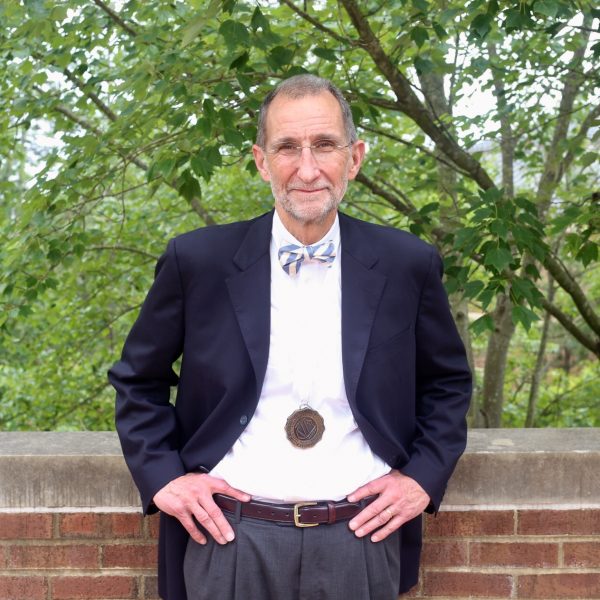William Lee Roper, Distinguished Service Medal Citation
Posted on May 11, 2019(Editor’s Note: The GAA’s Distinguished Service Medal citations, such as this one, are read to the audience at the Annual Alumni Luncheon and then presented as a keepsake to the recipients.)
Bill Roper has traveled the fast lanes of the health care circuit for many years — very much at his own speed.

Dr. William Lee Roper
He folds his lanky frame into a Mini. When a fender came off in a mishap, he duct-taped it back on and called it good. Most days for lunch, he pulls out his tofu and carrot sticks; a couple of times a week he treats himself to a peanut butter sandwich, no jelly, at Sutton’s.
Bill feels no need to wear his success on his sleeve. He chose a career in public service as far back as high school. Let others try to capture the attention of everyone in the room — Bill will be content to capture the nuances of national health care policy and seek workable solutions for the people of North Carolina.
His quiet demeanor enables him to calm roiled waters in a volatile business. Some years back, when a member of Congress chastised him for “not being Republican enough,” he listened thoughtfully. At the end of their meeting, he pulled a few sheets of paper out of his desk drawer and said, “I thought you might be interested in seeing this.” They were the talking points he had given President Ronald Reagan for his State of the Union address. The congresswoman left his office better educated.
A pediatrician educated at public universities in his home state of Alabama, Bill started his career as a county health officer in Birmingham and taught at the University of Alabama’s school of public health. Reagan selected him as a White House fellow in the Office of Policy Development, then as special assistant to the president for health policy. In short order, he was promoted to administrator of the Health Care Financing Administration, directing the finance programs for Medicaid and Medicare. He directed the White House Office of Policy Development under President George H.W. Bush, and later directed the Centers for Disease Control and Prevention.
While Bill was senior vice president of Prudential Health Care, Chancellor Michael Hooker ’69 came calling in 1997 to recruit him as dean of UNC’s School of Public Health. Given Bill’s fat resume and his thin ties to the state, Michael doubted he could keep him here long, but wanted his expertise nonetheless. That was 22 years ago.
When he stepped down as dean of the medical school and CEO of UNC Health Care last fall, the system he had shepherded stretched into a complex of general and specialty hospitals on his own campus, and a system of hospitals from Hendersonville in the west to Goldsboro and Kinston in the east, including Rex in Raleigh. The now-10-year-old N.C. Cancer Hospital was a milestone on the campus at Chapel Hill, and it and the revolutionary Marsico Hall — home to five major medical disciplines once spread across the campus — also represent significant state investments in Carolina’s medicine facilities.
Research funding to UNC has exploded over the past six years. Growth continues after Bill — a large, critically needed surgical tower and a new medical school building are in the works.
He was a giant figure in the building of the collaborative environment among Carolina’s prestigious schools of medicine, dentistry, pharmacy, nursing and public health, and the other scientific disciplines on whose expertise they rely.
Bill has a reputation for being a problem solver, a deep thinker and a man of big, bold ideas. He had the vision to see the advantages of merging UNC’s health care system with Atrium in Charlotte. He had the wisdom to recognize when it would not work and the courage to end the negotiations. He had the tenacity to reach an equitable resolution when WakeMed wanted to purchase UNC Rex Healthcare.
From his commitment to public service, Bill gleans satisfaction from making life better for people, whether it’s through improving the health of North Carolinians as head of the state’s largest public health care system in a time when the health care industry seems to get more complex by the day, or through ensuring that higher education is not priced out of reach for people of modest means.
He was a valued resource for North Carolina lawmakers on both sides of the aisle in complex issues such as Medicaid, health care financing and mental health services.
Maryann Roper is a pediatrician — that’s how she and Bill met — and their son, Will, is graduating from the medical school this weekend. A return to pediatrics teaching awaited Bill, but when Margaret Spellings closed out her term as president of the state’s university system, it could not afford a caretaker interim — Bill was a very quick choice, and an eager one.
“I believe in public service as a noble calling,” he said, “as George Herbert Walker Bush, whom I used to work for, said, and I think what it means to be dedicated to public service, among other things it means that when you’re asked to do something, unless you have a compelling reason not to do it, you pretty well ought to do it.”
The GAA’s Distinguished Service Medal citations, such as this one, are read to the audience at the Annual Alumni Luncheon and then presented as a keepsake to the recipients.
